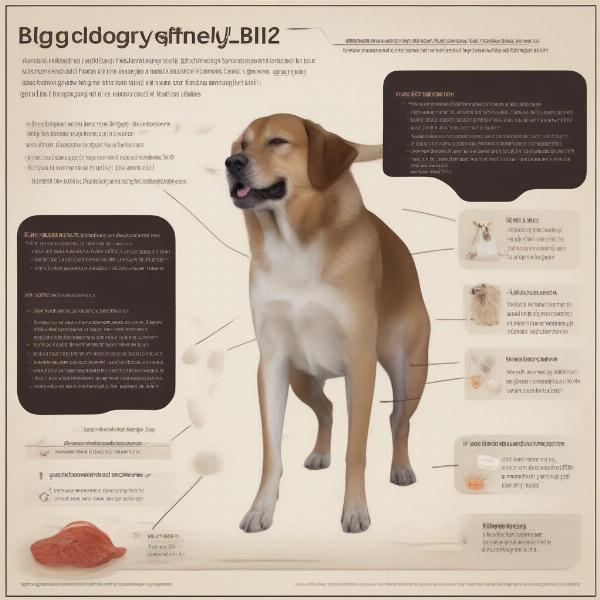B12 supplements for dogs are becoming increasingly popular, but are they necessary for every dog? This article will delve into the importance of vitamin B12 for canine health, the signs of deficiency, and when supplementation might be beneficial. We’ll explore the different types of B12 supplements available, appropriate dosages, and potential side effects. Whether you’re a seasoned dog owner or a new puppy parent, understanding the role of B12 in your dog’s diet is essential for their overall well-being.
Vitamin B12, also known as cobalamin, plays a crucial role in various bodily functions, including red blood cell formation, nerve function, and DNA synthesis. While dogs can typically obtain B12 through their diet, particularly from animal-based protein sources, certain conditions can lead to deficiencies.
Signs of B12 Deficiency in Dogs
How do you know if your dog is lacking B12? Several signs can indicate a potential deficiency, including lethargy, weakness, loss of appetite, weight loss, and neurological issues such as tremors or seizures. If you notice any of these symptoms, it’s crucial to consult your veterinarian for a proper diagnosis and treatment plan.
 Dog showing B12 deficiency symptoms
Dog showing B12 deficiency symptoms
When to Consider B12 Supplements for Your Dog
While a balanced diet usually provides sufficient B12, some dogs may benefit from supplementation. Dogs with gastrointestinal issues, such as inflammatory bowel disease or exocrine pancreatic insufficiency, often have difficulty absorbing B12 from their food. Senior dogs, giant breeds, and dogs on vegetarian or vegan diets may also be at higher risk of deficiency.
Choosing the Right B12 Supplement
Various B12 supplements are available for dogs, including tablets, capsules, injections, and liquid drops. It’s essential to choose a high-quality supplement specifically formulated for dogs and follow your veterinarian’s recommendations for dosage.
Dosage and Potential Side Effects
The appropriate dosage of B12 will vary depending on the dog’s size, age, and the severity of the deficiency. Your veterinarian will determine the correct dosage for your dog. While B12 is generally considered safe, potential side effects can include diarrhea and itching. Always monitor your dog for any adverse reactions and inform your veterinarian if any occur.
Are B12 Supplements Safe for Puppies?
While B12 is essential for puppy growth and development, it’s crucial to consult with your veterinarian before giving any supplements to your puppy. They can assess your puppy’s individual needs and recommend the appropriate dosage, if necessary.
What Foods are High in B12?
Naturally occurring B12 can be found in animal products such as liver, kidney, fish, eggs, and meat. Adding these to your dog’s diet, under veterinary guidance, can help increase their B12 intake. vegan diet for dogs recipes may require careful planning to ensure adequate B12 intake. You might want to consider incorporating beef kidney for dogs or liver paste dog as treats.
Long-Term Use of B12 Supplements
While short-term supplementation is often beneficial, it’s important to understand the potential implications of long-term B12 supplement use. Discuss with your vet the need for ongoing supplementation and any potential risks or adjustments needed. Sometimes, underlying conditions might contribute to B12 deficiency, and addressing those may be more beneficial than continuous supplementation. Similar to vitamin b complex for dogs, prolonged use should be monitored. canine red cell for dogs is another supplement that can be beneficial, especially for dogs with anemia, which can sometimes be associated with B12 deficiency.
Conclusion
Ensuring your dog receives adequate B12 is crucial for their overall health and well-being. While a balanced diet is usually sufficient, supplementation may be necessary in certain cases. Consult your veterinarian for guidance on whether B12 supplements are right for your dog and to determine the appropriate dosage.
FAQ
- Can I give my dog human B12 supplements? No, it’s essential to use B12 supplements specifically formulated for dogs.
- What are the signs of B12 overdose in dogs? While rare, excessive B12 can lead to digestive upset. Consult your vet immediately if you suspect an overdose.
- How long does it take to see improvement after starting B12 supplements? Improvement can vary, but you may see positive changes within a few weeks.
- Are there any natural ways to increase my dog’s B12 intake? Including B12-rich foods like liver and kidney, under veterinary guidance, can be beneficial.
- Can B12 deficiency be cured? With appropriate treatment, such as supplementation or dietary changes, B12 deficiency can often be managed effectively.
- Are there any breeds predisposed to B12 deficiency? Giant breeds and some small breeds can be more susceptible.
- Can stress affect B12 levels in dogs? While not a direct cause, chronic stress can impact nutrient absorption, potentially affecting B12 levels.
ILM Dog is a leading online resource dedicated to providing dog owners with expert advice and information on all aspects of canine care, including breed selection, health, training, nutrition, and grooming. We offer valuable insights into choosing the right products and accessories to enhance your dog’s well-being. For expert advice on dog nutrition and other pet care needs, contact us via email at [email protected] or by phone at +44 20-3965-8624. ILM Dog is committed to providing the best possible care for your canine companion.